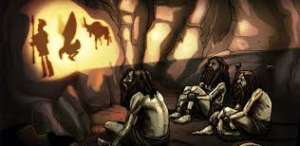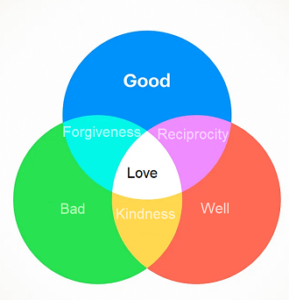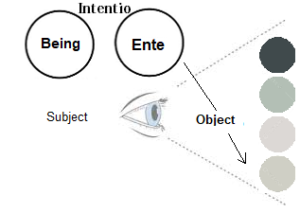
Posts Tagged ‘ontologia’
Language, truth and the eternal
Leibniz (1646-1716) theorized that truth is related to reason: “I understand by reason, not the faculty of reasoning, which can be used well or badly, but the chain of truths which can only produce truths, and one truth cannot be contrary to another”, so from a half-truth a truth cannot emerge, this is the problem with contemporary narratives and truth is linked to Being through language.
related to reason: “I understand by reason, not the faculty of reasoning, which can be used well or badly, but the chain of truths which can only produce truths, and one truth cannot be contrary to another”, so from a half-truth a truth cannot emerge, this is the problem with contemporary narratives and truth is linked to Being through language.
Leibniz’s philosophical project included a “symbolic language” that would be the very language of philosophy, he called it “characterística universalis” through which we could express truth, but in his time the division between realism and nominalism led to a victory for Enlightenment realism, and Leibniz and his disciple Christian Wolff (1679-1754) were rejected (picture).
Leibniz thought of three principles for his project: Identifying and structuring simple ideas hierarchically, stipulating a suitable system of signs and establishing logical rules for composing complex ideas.
Christian Wolf goes so far as to elaborate a system of concepts, different from Porphyry’s tree of knowledge, but also based on Aristotelian thought (Isagoge). It is from Porphyry (232-304) that Boethius takes the famous quarrel about universals: whether universals are things or just words (categories of Aristotle) that we attribute as names to things.
Modern ontology, especially in Hannah Arendt and her interpreter Byung-Chul Han, creates new concepts that link this dualism in thinking about the Vita Activa and the Vita Contemplativa: “the quest for immortality, for immortal glory, is, according to Arendt, ”the source and center of the vita activa“ (Han, 2023, p. 145), but ”he must return to his surrounding world” (idem).
One thus lives in a paradox between the eternal and the temporal: “as soon, however, as a thinker abandons the experience of the eternal and begins to write, he surrenders to the vita activa, whose ultimate goal is immortality” (pgs. 145-146).
Arendt “marvels at Socrates who doesn’t write, who voluntarily renounces immortality” (Han, 2023, p. 146), even though writing “can be a contemplation that has nothing to do with the quest for immortality” (Han, 2023, p. 146), one can also think of the experience of Jesus who didn’t write at all, so one should follow his word and his example and not his writing, thus orality has “vita activa” (actions life) while writing seeks potency.
Arendt also recalls Plato, but Han thinks that this “distorts” Plato’s allegory, “it is the story of a philosopher who frees himself from the chains that bind him and his companions” (pp. 147-148), he acts when he returns to the cave “with its shadows, to a regime of truth”.
To put words into the vita activa is therefore to imitate them, neither proclaiming them nor quoting them, says Han: “The vita activa without the vita contemplativa is blind” (Han, 2023, p. 149).
Han, B.-C. (2023). Vita Contemplativa: ou sobre a inatividade. Trad. Lucas Machado, Brazil, Petrópolis, RJ: Vozes.
Language and its fruits
Hermeneutics is the art or technique of![]() interpreting and explaining texts. Originating in Greek, it also applies today to the ontology and philosophy of language, and is used to interpret not only traditional texts and philosophies, but also sacred texts and legal texts.
interpreting and explaining texts. Originating in Greek, it also applies today to the ontology and philosophy of language, and is used to interpret not only traditional texts and philosophies, but also sacred texts and legal texts.
The serious problem with language today is its perspective of a fragmentary and distorted analysis of texts, while hermeneutics is used for true interpretation (etymological aspects, translation and meaning), the use of language to justify power was more typical of the sophists in ancient modernity.
So the fruits of true linguistic expression, and of philosophical hermeneutics, was to build a branch of philosophy that studies the theory of interpretation. There are several authors, but I would highlight Hans-Georg Gadamer, who is fundamental to a humanistic perspective.
Gadamer reconstructs the concept of preconception, removing the negative charge of pre-judgment that it had acquired in illustration, giving it an essential character within hermeneutics, since it allows the fusion of horizons, within the hermeneutic circle prior to dialogue.
He thus rejects the idea of a knowledge of the past through pure reason, without the mediation of the interpreter’s own tradition, since this prevents the fusion of horizons and dialog.
He thus rejects the idea of a knowledge of the past through pure reason, without the mediation of the interpreter’s own tradition, since this prevents the fusion of horizons and dialog.
The interpreter doesn’t just carry out a “reproductive” activity of the text, but updates it according to the circumstances of the moment, which is why they speak of their ‘productive’ labor (Gadamer, 1997), there is no direct reference to Hannah Arendt’s concept of “labor”, but it fits well with the text, a natural and non-durable activity that is exhausted when it is carried out.
So is the productive use of language, words that are actions that trigger attitudes of help, rescue, solidarity and dialogue, even if they have different interpretations, the important thing is that humanitarian language leads to actions in favor of society and fruitful principles.
You can’t pick figs from thorns, a good tree can’t bear bad fruit, language that is directed towards good humanitarian initiatives won’t have negative results, so it easily moves towards a dialogue if the “fusion of horizons” is the starting point for interpretation, the basis of a hermeneutic dialogue.
Gadamer, Hans-Georg. (1997) Verdade e Método: Traços fundamentais de uma hermenêutica filosófica. Brazil, Petrópolis, RJ: Vozes.
Work, action and contemplation
Hannah Arendt considered that labor, work and action are the three spheres of human life that make up the “vita activa”, a thought that we have placed around Byung-Chul Han’s essay, which Arendt also uses to complement the Vita Contemplativa.
action are the three spheres of human life that make up the “vita activa”, a thought that we have placed around Byung-Chul Han’s essay, which Arendt also uses to complement the Vita Contemplativa.
It is not characteristic of modern man to think in this way, and this has put human thought and even scientific and religious thought at a standstill. Narratives arise as a consequence and not as a cause of this, it is through the fragmentation of human activities that the interpretation of reality becomes subject to a limited worldview.
Labor ensures the biological survival of the individual and the species (Arendt, 1995) while work, although it doesn’t individualize man, establishes a relationship with objects and with the transformation of nature, and allows him, and this is important, to demonstrate his craftsmanship and inventiveness (Arendt, 1995), but craftsmanship and inventiveness are not separate from thought, because there man conceives of his relationship with nature as a whole.
It was industrial work that destroyed this idea of the whole between work, labor and action, but noticing that artisanal work already included a contemplative vision, “Perché non parli?” said Michelangelo when completing his work “Moses”, meaning “why not speak?” (photo).
A little noticed detail, but certainly conceived by Michelangelo when he made his work, is the support of his right arm on the tablets of the law, we would say a first biblical codex, since the Torah was a scroll, and if compared to the statue of the Greek thinker, he is resting his head on his right arm, Auguste Rodin made his version around 1880.
Thus, work, labor and action can be united with the idea of contemplation, if we think of it as the conception of a previous thinker and included in the object, in this way we reunite and re-signify work and labor, no longer as an alienated attitude, but as an ontic Being.
Therefore, human work and its labor must be united with the ontological idea of Being, and it also means an act of love for humanity, for the Other and for the one who will use, conceive or just contemplate the action of labor.
Arendt, H. (1995). A condição humana. 7th. ed. Brazil, Rio de Janeiro: Forense Universitária.
Serenity: choosing what is good
There is no serenity without reasonable choices about personal, social and spiritual life, even worse is the one who tries to eliminate one of the three. Without personal life there is no being-there (Heidegger’s Dasein), without social life we live in a bubble, and without spiritual life we do not develop our essence.
about personal, social and spiritual life, even worse is the one who tries to eliminate one of the three. Without personal life there is no being-there (Heidegger’s Dasein), without social life we live in a bubble, and without spiritual life we do not develop our essence.
Among the choices we have to make in life, they cannot involve only one of the three aspects: the personal only makes us selfish and narcissistic, without the social we become alienated and have difficulty understanding reality, and without the spiritual we do not have a true asceticism that elevates us as human beings.
On the occasion of the centenary of his fellow countryman, the great musician Conradin Kreutzer, in a 1949 conference in his hometown of Meßkirch, Germany, wrote the text on Serenity.
Heidegger questions the difficulty of thinking even at that time, and asks if it is not through music and singing: “is not music distinguished by the fact that it ‘speaks’ through the mere resounding of its notes and does not need everyday language, the language of words?” and: “is it already a commemoration, which involves the act of thinking?” (Heidegger, 2008, p. 10).
Heidegger questions the difficulty of thinking even at that time, and asks whether it is not through music and song: “isn’t music distinguished by the fact that it ‘speaks’ through the mere resonation of its notes and does not need everyday language, the language of words?” and: “is it already a commemoration, which involves the act of thinking?” (Heidegger, 2008, p. 10).
When remembering his hometown, he recalls that [due to the war]: “they had to abandon their villages and cities, expelled from their native soil… they became strangers… and those who remained? They are often even more uprooted (heimatloser) than those who were expelled. Every hour and every day they are tied to radio and television… the cinema transports them weekly to the unusual domains, of representation that simulates a world that is not.” (Heidegger, 2008, p. 16), showing the relationship with technology. If you lived in our day and age, you would see how visible the relationship that is maintained is, now not transporting you to other realities, but to unrealities that transport your mind to the vulgar.
Thus, the choices that must be made become more radical. More than ever, it is necessary not only to choose what is good and healthy, but to fight so that this awareness is not lost in illusions.
Heidegger, M. (2008) Serenidade (Serenity). Lisbon: Instituto Piaget.
Evil and its ontological meaning
Every analysis of the contemporary world is permeated (if not itself) by a Manichaean sense: the struggle of good against evil, and this depends on the particular narrative.
permeated (if not itself) by a Manichaean sense: the struggle of good against evil, and this depends on the particular narrative.
Manichaeism presents good and evil as a basic question for understanding the universe, as opposing forces such as action and reaction, or attraction and repulsion – you could list a large number of contemporary books that describe reality in this way.
Here we are interested in two essential points: the religious sense and the political sense. In the religious world there is a growing discourse that “we are good against evil”, but a good reading of patristics (the religious of the early Christian era) helps us to understand that this is not the case.
Augustine of Hippo (354-430), who was a Manichaean for nine years, saw in Manichaeism the struggle between the soul and the body and thus justified the struggle between good and evil, but he revised this position under the strong influence of Ambrose of Milan (340-397), who was to exert a strong influence on Augustine, one of whose phrases was: “Tears do not ask for forgiveness, but achieve it” and so they achieve good.
Thus, Augustine began to give evil an ontological meaning, understanding that body and soul are related, saying: “However, I had no clear idea of the cause of evil. However, whatever it was, looking for it couldn’t force me to take an immutable God as mutable, if I didn’t want to become what I was looking for. That’s why, in my peaceful search, I was certain of the falsity of the doctrine of those from whom I had turned away out of conviction. I really saw that they were studying the problem of the origin of evil, being themselves immersed in malice, to the point of preferring to imagine your substance subject to evil, rather than recognizing themselves capable of committing it” (Augustine, 2014, p. 172) in other words, they achieve good.
It is also necessary, for an in-depth analysis, to read: “The Nature of Good”, “Free Will” to understand the problem of human freedom which can refuse to do good and free will which is this freedom of choice, but Confessions is his main work.
Augustine wanted to break away from dualism and in Confessions (pp. 174-175) he develops the idea that evil is not a substance, because if it were a substance, it would be a good. And, in fact, it would be an incorruptible substance and, therefore, undoubtedly a great good, and so what was corruptible and subject to deterioration has no eternal existence, so he exchanges his Manichaeism for Christianity.
Seen from the perspective of modern narratives that seek to deny the existence of the incorruptible and thus admit the existence of God or at least something incorruptible that gives substance to the cosmos, Byung-Chul Han says of modern narrative: “We live today in a post-narrative time. Not narration [Erzählung], but counting [Zählung] determines our life. Narrative is the capacity of the spirit to overcome the contingency of the body” (Sociedade Paliativa: a dor hoje, 2021, Brazil, ed. Vozes).
In order to justify all disaffection, we need a narrative; if we escape from it, we do good.
Agostinho. Confissões. Tradução de Maria Luiza Jardim Amarante. São Paulo: Paulus, 2014.
The cosmos, the noosphere and perdition
In the chapter on “The loss of salvation, the unknown adventure” in Edgar Morin’s book Terra-Patria, he takes a deep look at our lack of cosmovision and the perdition of our microscopic concerns that don’t look at the larger world and reality around us.
unknown adventure” in Edgar Morin’s book Terra-Patria, he takes a deep look at our lack of cosmovision and the perdition of our microscopic concerns that don’t look at the larger world and reality around us.
He says at the beginning: “If there were space navigators, their route in the Virgo cluster would ignore the very marginal Milky Way and pass far from the small peripheral sun that orbits the tiny planet Earth. Like Robinson on his island, we set out to send signals towards the stars, so far in vain, and perhaps in vain forever. We are lost in the cosmos” (Morin, 2003, p. 163).
He adds: “This world that is ours is very fragile at the base, almost inconsistent: it was born of an accident, perhaps of a disintegration of the infinite, unless we consider that it arose from nothing” (idem, p. 163).
But in modern times, man has made his ego bigger, he wants to be a kind of “Homo Deus” using the metaphor of Yuval Harari, whose subtitle is “a brief history of tomorrow”, also pessimistic like Morin, but the author of Terra-Pátria hopes that man will find a new, more promising future.
Morin recognizes that “Life, consciousness, love, truth and beauty are ephemeral… We are on the move. We are on the move. We are not marching along a demarcated path, we are no longer guided by the law of progress, we have neither messiah nor salvation, we walk in the night and in the fog” (pgs. 164), he adds: “We are on an unknown adventure. The dissatisfaction that makes the journey begin again could never be satisfied by this. We must assume uncertainty and restlessness, we must assume dasein, the fact that we are there without knowing why” (p. 166), recalling this category dear to Heidegger, who elaborated on the ‘forgetfulness of being’.
How to start the journey again, we might ask, the author gives a “good news-bad news” (recalling the good news meaning of the word Gospel): “Here is the bad news: we are lost, irretrievably lost. If there is a gospel, that is, good news, it must start from the bad news: we are lost, but we have a roof, a house, a homeland: the small planet where life has created its garden, where humans have formed their home, where from now on humanity must recognize its common home (p. 166), and the response, even if agnostic, is no different from the evangelical one.
And then he recalls this call: “The call to fraternity is not confined to one race, one class, one elite, one nation. It comes from those who, wherever they are, hear it within themselves, and it is addressed to each and every one. Everywhere, in every class, in every nation, there are beings of ‘good will’ who convey this message” (Morin, 2003, p. 167).
And those of us who know this message, this hope, must not remain silent, indifferent or, what is much worse, adhere to hopelessness. We must remember that Gospel message: “To whom much has been given, much will be required” (Luke 12:39-48) under penalty of omission, distortion or abandonment of the fundamental message of earthly and heavenly salvation.
MORIN, Edgar and Kern, Anne-Brigitte. (2003) Terra-Patria “Earth-Patria”. Transl. Paulo Azevedo Neves da Silva. Brazil, Porto Alegre : Sulina.
Power, Anger and Time
At a time of threats and hatreds that call into question not only peoples, nations and cultures, but even the process of civilization, it is good to review what we think of power and anger.
question not only peoples, nations and cultures, but even the process of civilization, it is good to review what we think of power and anger.
Sloterdijk (2006) had developed the question of Anger in current times, in a context of political psychology, values such as pride, ambition and vanity contribute to what can be called, in times of networks, a verticalization of social life.
The author explains that the social theories of “social stratification based on domination, regression and privilege” have been replaced by ideas of individual disciplining (asceticism, virtuosity and performance), which are seen as the causes of vertical differentiation.
This seemed obvious both to Michel Foucault, the sponsor of this interpretative approach, who in the 1970s denounced the intimate relationship between discourse and discipline, and to the vision of the linguistic turn, in his famous language games, which linked the latter to behavioral figures and opened up to sociology (and some half-philosophies) the understanding of latent rituals, typical of communicative games.
Half-philosophies because Sloterdijk will contest this reading and also various strands of Anglo-American analytical philosophy, which see language games as egalitarian and relativist, which they are not.
The so-called vertical tension in Sloterdijk’s work has great relevance for ethics and pedagogy, as it establishes a hierarchy between values, without which ethics is sabotaged, and the educator, in pursuing something higher than the student, must have something more in his soul and body, and this is his discourse on “the exercise society”.
What these authors draw attention to is the contemporary destruction of interiority, a theme that Byung-Chul Han goes to the root of, but which Heidegger, Hannah Arendt and now Sloterdijk have already drawn attention to: being-in-the-world has destroyed what was considered for thousands of years to be the most important thing: radically distinguishing oneself from this world.
In Heidegger this discourse is already present, pointing out that man as someone who no longer has an interiority that can serve as a shelter, for the fugitive from the world that he would eventually choose to be, modern conditions, opposes the certainty of a more than true life on the horizon of reality or in a hypothetical “end of the world”, this was written long before today’s apocalyptic and pseudo-prophetic visions, without seeing the absence of asceticism.
Hans Jonas wrote: “act in such a way that the effects of your action do not endanger the permanence of authentic human life on earth!” (Jonas, 2006) and Edgar Morin calls for a (re)humanized humanity, finally reversing the process of violent power, hatred and war.
JONAS, Hans. (2006) Das Prinzip Verantwortung: Versuch einer Ethik für die technologische Zivilisation. Frankfurt Suhrkamp.
SLOTERDIJK, P. (2006) Zorn und Zeit. Frankfurt: Suhrkamp.
Ontology, idealism and truth
Heidegger’s thought must start from the question of Spirit in Hegel, read by Byung-Chul in Introduction to the Phenomenology of Spirit “in terms of the forgetfulness of being” (Heidegger’s central question), he sees it as an “arid self” that finds “its limitation in the being that meets it” (Han, p. 334 quoting Hegel).
of Spirit in Hegel, read by Byung-Chul in Introduction to the Phenomenology of Spirit “in terms of the forgetfulness of being” (Heidegger’s central question), he sees it as an “arid self” that finds “its limitation in the being that meets it” (Han, p. 334 quoting Hegel).
Although he recovers Hegel, in part, in the epigraph to the last chapter: “truth is the whole”, he re-discusses dialectics and its metaphysics in idealism: “in relation to ‘just being’, which empties it to a name ‘that no longer names anything’, natural consciousness … when it becomes aware of being, assures itself that it is something abstract. “ (Han, 2023, pg 336).
Natural consciousness (seen in this way) “dwells on ‘perversities’ … “it tries to eliminate one perversity by organizing another, without remembering the authentic inversion” where ‘the truth of the essence of being is gathered into being’ (pg. 336 with quotes from Heidegger), which sees this as a step backwards and the forgotten, misunderstood ‘already’ (pg. 337), does not appear completely negated, it appears in the form of ‘not yet’ which is not a negation, nor a barricade, placed ‘next to the already prevents it from appearing’ (pg. 337).
There is a whole development in contrast to Hegel’s dialectic, more than a topic, it could well be a book, but the dialogue he engages in with Derridá and Adorno in the chapter on Mourning and the work of mourning, leads to his vision of the whole outside of dialectical abstraction, he says the concern with immortality, with death and with the work of mourning.
The “cardiographic” archive of the history of philosophy, in which the philosopher “works” to reverse the negative of being, is not the only secret in the heart of Plato or Hegel (p. 384).
This is what will form the basis of his “work of mourning”: “to be capable of death as death”, that is, to be capable of mourning, this “tragedy” “differs radically from the noisy work of mourning of the Hegelian dialectic” (Han, 2023, p. 385).
“Tears free the subject from his narcissistic interiority … they are the spell that the subject casts over nature“ (Han, p. 394) now quoting Adorno, and the author states that ‘Aesthetic Theory is the book of tears (idem) and that contrary to Kant, and that ’the spirit perceives, in the face of nature, less its own superiority than its own naturalness” (p. 395).
“The aesthetic experience shakes the narcissistic subject who thinks he is sovereign and causes the hardened principle of the ‘I’ to crumble … the tear of the shaken and moved subject proves to be capable of truth” (p. 395).
Capable of truth, of the infinite and for those who believe in God, not a God of passing goods and false joy, but that of the already, but not yet, that beyond the pain and transience of temporal things.
Han, B.C. (2023) Coração de Heidegger: sobre o conceito de tonalidade afetiva em Martin Heidegger. Transl. Rafael Rodrigues Garcia, Milton Camargo Mota. Brazil, Petrópolis: Vozes.
Noetics, Ontologie and War
For Plato, noesis is superior to dianoia, which is discursive and apparently logical, while the former is a high possible mental activity, inhabiting the sphere of Good and Harmony.
is discursive and apparently logical, while the former is a high possible mental activity, inhabiting the sphere of Good and Harmony.
It is a possibility of access to the “divine” world (Plato’s highest good which is in the eidos), it is transcendent, absolute, beyond ordinary human reasoning, philosophers pursue it without even touching on the question of the belief in a higher God where noesis “dwells”, it is not Being, but a mental attitude.
Dianoia, on the other hand, while it inhabits logical, mathematical and technical reasoning, is attached to what the mind can grasp of the earthly world, even though it admits to mistakes, truths that are not absolute and sometimes confusing, they inhabit the daily life of the human being, who is also disconnected from Being.
There is a foundational line that goes from phenomenology to the anthropotechnics of Peter Sloterdijk and Byung-Chul Han, essentially involving the question of Being, the link between noesis and noema, weakened by the bombardment of narratives that the digital universe has provided, but the forgetting of being, the absence of interiority have led to what Chul-Han calls “deauritization” and “pure facticity”:
“The disenchantment of the world expresses itself as de-auritization. Aura is the radiance that elevates the world beyond its pure facticity, the mysterious veil that envelops things” (Han, 2023, p. 80).
It’s not a question of denying facticity, but of not allowing its noesis, that is, the initial comprehension in the mind in all its aura, it makes a “narrative selection”, in the words of Byung-Chul (talking about photography): “It extends or shortens the temporal distance. It skips years or decades. Narrativity is opposed to chronological facticity” (Han, 2023, p. 81).
These are the lies of wars, of all wars because they hide their real motives, but particularly of current wars because they use narratives to change what is evident if read in chronological facticity, in a very current example, last week’s bombing of a hospital for the elderly in Ukraine (photo) and the bombing of UN bases in Lebanon, this correlates with cruelty and the absence of any narration to justify them.
Peace lies in the hearts and authorities that maintain the aura of hope, the spirit of solidarity.
Han, Byung-Chul. (2023) A crise da narração. Transl. Daniel Guilhermino. Brazil, Petrópolis: Vozes.
Heidegger and the affective tone
Intentionality is inherent to Being, it is a manifestation of interiority.
manifestation of interiority.
As a good orientalist, although based in Germany, Byung-Chul Han’s analysis does not start from the objectivist, materialist or substantialist perspective of the classic authors of Western philosophy, but from the holistic perspective of what he calls “affective tonality” in Heidegger.
To understand this different form of ascesis, contrary to the distance from the object that idealism proposes, the affective tonality “possesses an a priori anteriority that is not, however, attributable to the transcendental capacity of the subject, a pre-vision that sees before the object be outlined” (page 58).
Understanding objects as “beings”, “letting entities be, which is an attunement, penetrates and precedes all behavior that remains open and develops” and “the opening of entities in their totality does not coincide with the sum of currently known entities” (pg. 58), so any rationalist analysis is fragmentary and does not “see” the entities.
And furthermore, the “in the midst of beings in totality” is not verified by any reflection, so the thematization itself, “which always proposes an original scenario” is already an interpretation (pg. 59).
The affective tonality opens the space of there, according to Han, “which floods consciousness and which must be given in advance so that it can begin its thematizing work and discourse, and concludes with a quote from Heidegger: “Consciousness is only possible on the foundation of there as a derivative mode of it”.
Thus “the a priori event already presupposes an interpretation, and this temporal difference, which is placed before the interval of countable time, remains constitutive for the difference between being and being” (pg. 59), which is why ontologically the difference exists and not the idealistic separation as idealism supposes.
Thus, true ascesis is not a separation of the world (objective and subjective), but in the world through the difference between being and being, only a divided ascension (through death) can definitively separate being from being, thus we are in the relationship of an “affective tone ”.
Han, B.C. (2023) Coração de Heidegger: sobre o conceito de tonalidade afetiva em Martin Heidegger (Heidegger’s heart: on the concept of affective tonality in Martin Heidegger). Transl.Rafael Rodrigues Garcia, Milton Camargo Mota. Brazil, Petrópolis: Vozes.

